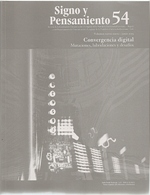Games and Digital Culture… What Lies Behind on-line Games?
##plugins.themes.bootstrap3.article.details##
This article is the result of research work (still in progress) on state of the art Mass Multiplayers Online Games (mmolg), in an attempt to build a theoretical and methodological descriptive framework of mmolgs that synthesizes the main approaches and problems susceptible of study on the knowledge so far produced vis-à-vis this cultural phenomenon. The research team is constituted by lecturers in charge of four research groups of the School of Language and Communications, i.e. Language and Cognition; Information Sciences, Society, and Culture; Communications and Media, Culture, and Learning; and Information Society.
Digital games, Juegos Masivos en Línea de Múltiples JugadoresJuegos digitales, Juegos Masivos en Línea de Múltiples JugadoresJogos digitais, Jogos Online Maciços de Múltiplos Jogadores
Chiuppesi, M. (2005), “MMORPG: a review of social studies” (en línea), disponible en: http:// www.serra.unipi.it/dsslab/trimestrale/2005/ mmorpg%20-%20en.pdf, recuperado: 1 de mayo de 2008.
Gil, R.; Tavares, J. P., y Roque, L. (2005), “Architecting Scalability for Massively Multiplayer Online Gaming Experiences”, University of Coimbra.
Huizinga, J. (1998), Homo Ludens, Madrid, Alianza.
Kelman, N. (2008), “La era del videogame” (en línea), disponible en http://archivodocumental.wordpress.com/category/informatica/videojuegos/ recuperado: 21 de abril de 2008.
Klastrup, L. (2003), A Poetics of Virtual Words. Proceedings of the Fifth International Digital Arts and Culture Conference, RMIT, Melbourne. “Multiplayer on Line Game Directory” (en línea), disponible en: http://www.mpogd.com/ games/massively.asp?first=Z, recuperado: 27 de noviembre de 2007.
Murray, J. (1997), Hamlet in the Holodeck, the Future of Narrative in Cyberspace, MIT Press, Cambridge.
Salazar, J. (2005), “On the Ontology of mmorpg Beings: A Theoretical Model for Research. Proceedings of DIGRA 2005”, en Changing Views-Worlds in Play (en línea), disponible en http://www.digra.org, recuperado: 2 de abril de 2008.
Salazar, J. (2004), “Cybontology: The Ontology of the Online Being and the (re)localization of the Notion of the ‘cyborg’”, en II Congreso online del observatorio para la cibersociedad (en línea), disponible en http://www.cibersociedad.net/congres2004/index_es.html, recuperado: 8 de mayo de 2008.
Squire, K. (2002), “Cultural Framing of Computer/Video Games”, Game Studies, vol. 2, Issue 1.
Squire, K., Steinkuehler, C. (2004), Generating Cybercultures; The Case of Star Wars Galaxies. Chapter Submission for Cyberlines: Languages and cultures of the Internet, 2. a ed., Albert Park (Australia), James Nicholas Publisher.
Taylor, T. L. (2004), “The social Design of Virtual Worlds: Constructing the User and Community Through Code”, en: Consalvo M. et al. (eds.), Internet Research Annual, vol. 1, Selected Papers from de Association of Internet Researchers Conferences 2000-2002, Nueva York, Peter Lang.


